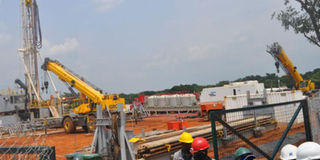Minister to banks: Finance projects in energy, oil sectors

Beneficiaries. An oil drilling site by Tullow in Buliisa District. Although the delay in bringing oil to the ground could hold back revenues, it could turn out to be a blessing in disguise as international oil prices show signs of recovery. FILE PHOTO
Kampala- One of a bank’s core tasks is to provide loans that allow companies to invest and create jobs.
Loans also allow individuals to buy, for example, a car, house or new machines for capital investments. The bank then earns money from the interest it receives on these loans.
Giving out loans is not free from risk, however, as the bank can never be sure that the company or individual will repay the money within the agreed timespan.
To this effect, banks in Uganda have been asked by the ministry of Energy to become active in investing in Uganda’s energy, oil and mineral sector because there are a lot of investment opportunities in this sector with a lot of money.
Speaking during the annual Uganda Bankers Association (UBA) dinner in Kampala last week, Energy minister Irene Muloni said there are many projects designed by government which need financing from local and international institutions.
She said: “Let us prepare ourselves and form partnerships; the minerals in this country are enormous. Banks in Uganda have a key role to play in the existing investment opportunities.”
She added: “This is ready business through joint ventures and I don’t see why you don’t take up these opportunities, we need huge capital requirements for investing in energy and investment in mineral, I am hopping we will see more collaboration from the banks.”
With the planned investments in the energy, oil and gas and in the mineral sector by the government, Muloni said what this means to the financial institutions is money that they must take part in it.
For example, Ms Muloni said 1,445 km oil pipeline is going to cost $4 billion. “Why not tap into these opportunities? We create an enabling environment so that you all participate,” she said.
To have all the finances needed for the planned projects in the energy and the mineral sector, Ms Muloni said Uganda needs to access the international market.
On the current energy connection status, Ms Muloni said in the last one year government has increased the power generation capacity to 950 megawatts.
Once completed, Karuma dam is expected to provide 600 megawatts, Nsimbe 383 megawatts, Agago 41 megawatts and 150 megawatts is expected to be generated with rural electricity programme in place.
“We have already connected 98 per cent of the districts the remaining will be connected in the financial year 2018/19. We want to have electricity. She said the 25 industrial parks that have been programmed will have power,” she said.
However, Ms Muloni said: “We are not maximally utilising the power being generated, so we want to reduce tariff by increasing efficiency,” she said.
With industrialisation in place, Ms Muloni expressed optimism that more industries will lead to more usage of power.
To increase power connections, Ms Muloni said: “We are going to begin providing free connections for electricity; this going to help us increase demand for power utilization.”
The Chairperson UBA, who is also the managing director Centenary Bank, Mr Fabian Kasi, said bankers have noted with optimism the positive developments in the energy sector (oil and gas).
He said: “We therefore look forward to actively engage with you both through the Chamber of Mines and Petroleum as well as through our ministry to demonstrate that support.”




